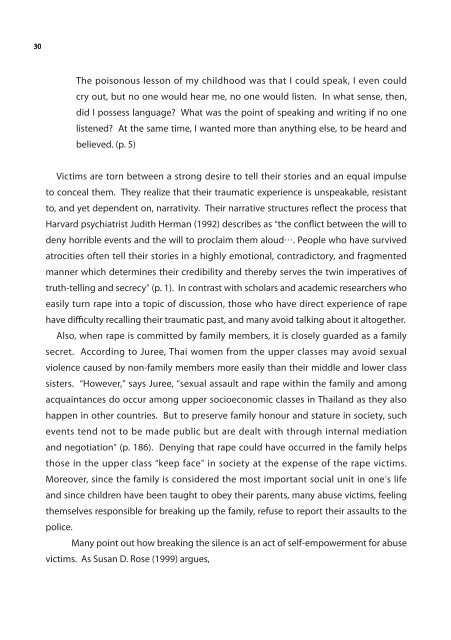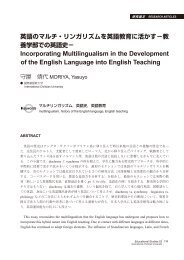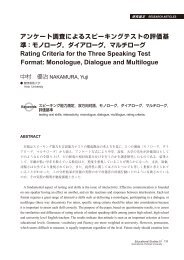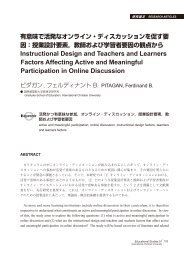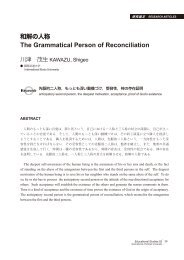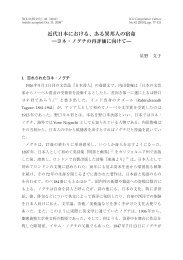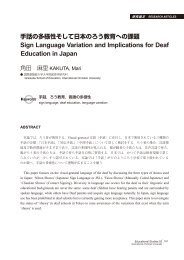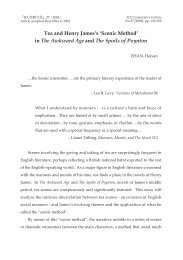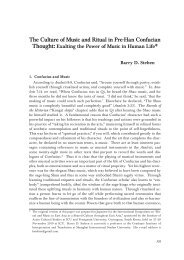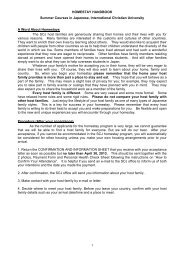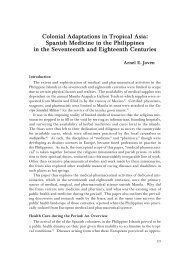Untitled - subsite - å½éåºç£æ大å¦
Untitled - subsite - å½éåºç£æ大å¦
Untitled - subsite - å½éåºç£æ大å¦
You also want an ePaper? Increase the reach of your titles
YUMPU automatically turns print PDFs into web optimized ePapers that Google loves.
30<br />
The poisonous lesson of my childhood was that I could speak, I even could<br />
cry out, but no one would hear me, no one would listen. In what sense, then,<br />
did I possess language What was the point of speaking and writing if no one<br />
listened At the same time, I wanted more than anything else, to be heard and<br />
believed. (p. 5)<br />
Victims are torn between a strong desire to tell their stories and an equal impulse<br />
to conceal them. They realize that their traumatic experience is unspeakable, resistant<br />
to, and yet dependent on, narrativity. Their narrative structures reflect the process that<br />
Harvard psychiatrist Judith Herman (1992) describes as the conflict between the will to<br />
deny horrible events and the will to proclaim them aloud. People who have survived<br />
atrocities often tell their stories in a highly emotional, contradictory, and fragmented<br />
manner which determines their credibility and thereby serves the twin imperatives of<br />
truth-telling and secrecy (p. 1). In contrast with scholars and academic researchers who<br />
easily turn rape into a topic of discussion, those who have direct experience of rape<br />
have difficulty recalling their traumatic past, and many avoid talking about it altogether.<br />
Also, when rape is committed by family members, it is closely guarded as a family<br />
secret. According to Juree, Thai women from the upper classes may avoid sexual<br />
violence caused by non-family members more easily than their middle and lower class<br />
sisters. However, says Juree, sexual assault and rape within the family and among<br />
acquaintances do occur among upper socioeconomic classes in Thailand as they also<br />
happen in other countries. But to preserve family honour and stature in society, such<br />
events tend not to be made public but are dealt with through internal mediation<br />
and negotiation (p. 186). Denying that rape could have occurred in the family helps<br />
those in the upper class keep face in society at the expense of the rape victims.<br />
Moreover, since the family is considered the most important social unit in ones life<br />
and since children have been taught to obey their parents, many abuse victims, feeling<br />
themselves responsible for breaking up the family, refuse to report their assaults to the<br />
police.<br />
Many point out how breaking the silence is an act of self-empowerment for abuse<br />
victims. As Susan D. Rose (1999) argues,


